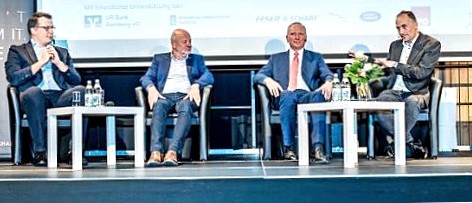Bamberg speech therapy

Christoph hagele if wilfried kamper should have feared to provoke with his message a disappointed exodus from the hallstadter culture floor, then the executive committee of the economy club bamberg may have fallen several stones from the heart on monday.
As a drawing card and attention magnet for his event "autoland deutschland – does ecology and economy contradict each other??" The business club had sigmar gabriel firmly in mind. On sunday evening, gabriel cancelled the course for health reasons.
Dwindling radiance?
Gabriel’s cancellation was acknowledged by the audience with a few sighs. But no one loved the auditorium. This may be explained by the fact that the former SPD chairman and minister of economics, the environment and the environment is in fact losing his charisma.
But the calmness speaks even more for the fact that the public was concerned with the matter at hand. And not about the names. His former party leader was represented in hallstadt by bernd westphal. The 59-year-old from lower saxony is the energy policy spokesman for the SPD’s parliamentary group in the bundestag. He was joined on the podium by green politician and environmental lobbyist hans-josef fell and sebastian gatz in his dual role as physicist and manager at dresden plant manufacturer von ardenne.
The moderation was taken over by the bamberg psychology professor claus-christian carbon.
A living laboratory
To the point: the upheaval in the automotive industry, fueled by ecological pressures, is hitting the bamberg region with full force.
Because around 20,000 jobs, and with them identities, life trends, family members and purchasing power, depend on automobiles. "People in the automotive industry are quite rightly worried about their jobs", said fell on monday.
For their part, the district administrator, the mayor and the members of parliament have decided not to self-pityingly mourn the looming end of the golden age, nor to aggressively deny it. Instead, the region wants to reinvent itself as a living laboratory. In and around bamberg, the transition from combustion engines to alternative drives is to be tested under real conditions.
Although the old is rapidly losing its power, the new is only emerging in outline at best. At this intermediate stage, people are particularly sensitive to anger and fear. Vonnoten is the communicative embedding of change. Also the "autoland"-discussion was somewhat therapeutic in this sense. People expressed their fears and desires, they listened to each other, they exchanged ideas and experiences. The rough talk should shrink the challenges to dimensions that can be surveyed and dealt with.
"Out of apathy
The fully occupied cultural floor alone testified to the need for exchange. The need for explanation and meaning was also addressed by claus-christian carbon. The bamberg professor declared the upcoming challenges to be the identity-forming project of the bamberg burghers: "we have to get out of apathy together."
Carbon encouraged action because new things needed to be conquered. Fell and gatz urged action, because otherwise existing things would be irretrievably doomed: from 2030 onwards, no more CO2 could be emitted: "otherwise humanity will have no chance any more. Not even in bamberg", declaimed fell.
Both gatz and fell saw no alternatives to the radically accelerated expansion of renewable energies and equally radical investments in e-mobility. Where both boldly stepped out with bold visions, the brakes were put on with reference to the social consequences – job losses! – and democratic legitimacy requirements – election results! – bernd westphal their design optimism.
It was a pity that a representative of the suppliers based in bamberg was missing from the podium. Bosch plant manager martin schultz was only allowed to promote synthetic fuels in a debate contribution disguised as a question. There was no discussion about this.
Worried look to china
The next logical step in the rough language of the bamberger burgerschaft had to be to build even wider bridges between the individual systems – economy, society, politics and science. Then, for example, scientists would have to take the constraints of politics and business into account more than ever before.
However, it was already telling in this context that climate change was not the only issue on the agenda. Hardly less worried the participants, the essential products and services of the emerging ecological age could be produced in china. And not in bamberg or elsewhere in germany.